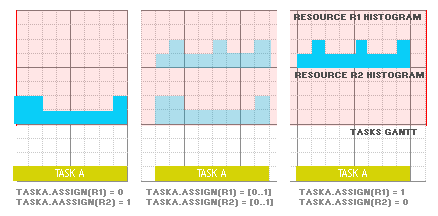has_assignment
has_assignment |
Purpose
In the following example, either task A requires resource R1 with resource profile [1,2,1,1,2,1,1,2], or task A requires resource R2 with resource profile [2,2,1,1,1,1,1,2]. The choice depends on the value of the decision variables A.assignment(R1) and A.assignment(R2) that can both take a value of 0 (the task is not assigned to this resource) or a value of 1 (the task is assigned to this resource).


Synopsis
function has_assignment(task:cptask, resource:cpresource) : boolean
Arguments
|
task
|
the task
|
|
resource
|
the resource
|
Return value
true IFF a cpvar representing the assignment of 'task' to 'resource' exists
Example
The following example illustrates this:
model "Alternative resources and non constant resource usage"
uses "kalis"
declarations
res1,res2 : cpresource
taska,taskb : cptask
arr1,arr2 : list of integer
end-declarations
! Fix start times and durations
taska.start = 3
taska.duration = 4
taskb.start = 3
taskb.duration = 4
! Define 2 cumulative resources
set_resource_attributes(res1, KALIS_DISCRETE_RESOURCE, 4)
set_resource_attributes(res2, KALIS_DISCRETE_RESOURCE, 4)
setname(taska,"taska"); setname(taskb,"taskb")
setname(res1,"R1"); setname(res2,"R2")
! Define alternative resources for both tasks
arr1 := [1,3,2,3]
arr2 := [2,4,1,3]
requires(taska, {resusage(res1,arr1),resusage(res2,arr2)}, 1, 1)
requires(taskb, {resusage(res1,1,1),resusage(res2,1,1)}, 1, 1)
! Find all solutions
while (cp_find_next_sol) do
cp_show_sol
end-do
end-model
Related topics

